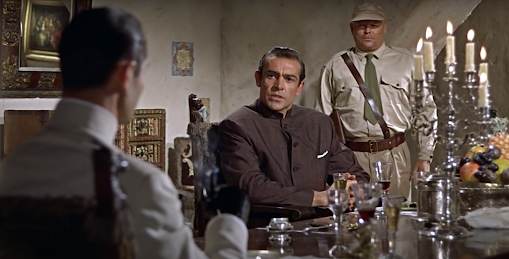A Pitch For James Bond
Ephraim Belnap
I'm not the biggest James Bond fan, but whenever it comes up I make the time to see it, and I'm always endlessly fascinated by its filmmaking process.
In many ways, James Bond is the first Marvel success story - a film series that kept on propagating itself due to financial and cultural success that lasted more than one generation. We'll see what happens to Marvel, but James Bond is a franchise that's managed to last over fifty years, and has still managed to keep itself relevant and exciting. It often has missteps, and it's very hard to get into sometimes, but it's combined goodwill and gravity can still sustain it.
That said, a successful film does more for it than an unsuccessful film. And despite fifty years of film, creators are still finding ways to deliver classic James Bond experiences while not becoming boring.
What makes James Bond so successful? Well, I'd argue it has an award-winning formula. What is that formula? Well, I tried to outline it below, under the heading, what happens in every or most entry?
I've only seen some of the Connery films, all of the Craigs and all of the Brosnans. Moore is kind of a blind spot and I've only seen a bit of Dalton's. But I think I have enough to make a rough pitch.
What the "showrunners" of the James Bond franchise freely admit is that it's very hard to write scripts for the film, and as most recently the Daniel Craig era has shown, even with a dedicated team quality can vary wildly from film to film. There are many organizational concerns that can hinder a good team or a good story. Maybe you can't get permission to film in a certain country. Maybe some financial backers insist on x thing happening. Maybe you need to make sure it makes money and so you try to cut the dialogue down. Maybe some actors get hurt. Maybe you shoot the film, but the actor isn't available for reshoots. And because James Bond is such a massive franchise, there are thousands of people wanting to put their "creative input" into the story - "wouldn't it be cool if y happened!?" - instead of focusing on what would actually make a good film.
Add on top of that, Bond is very easy to make misogynist in the modern day. Not because there's anything wrong with liking the ladies, but because he's such a power fantasy that it's easy to just turn the woman into a prop, which doesn't always turn out the best. He's also a symptom of the British establishment, so if you feel like talking smack about how arrogant or imperialist the British are, he's an easy target. But I don't think the worldwide appeal of Bond is because he's any of those things. I think he's a success because everyone loves the idea of going on adventures, traveling the world, fighting bad guys, staying at nice hotels, and meeting attractive people. It's a cracking good time.
So what am I getting at here? I think it's very possible to write a great Bond film - good writing skill assumed - and possibly even keep it great throughout the shooting and post-production process ... if you start from the formula. It lets you fit in all the stuff people are expecting anyway (whether they know it or not). And it lets you lay down some ground rules on production. "No, we're not doing that thing, because that deviates from the formula!"
It's true, a number of Bond films - perhaps virtually every - thrive off of deviating from formula in certain ways. But we can account for that.
Let's not ask, "What happens in every movie?"
Let's ask, "What happens in most of the movies?"
With that in mind, you can then create a plot outline that is genuinely sticking to formula, has room to fit a classic character arc and sufficient action setpieces, and has the flexibility to change in different ways during the course of production. This is something all screenwriters know. The studio will have notes. The producers will have notes. The actors will have notes. You have to be flexible. And James Bond is more prone to change than others. But if you communicate with everyone and lay down the importance of a formula, you can take that first step into the water with a writing tool everyone can use in the film's favor.
So, what is the James Bond formula? What happens in most every entry?
Let's begin.
--
JAMES BOND always wears a SUIT at some point
He usually travels to at least THREE DIFFERENT COUNTRIES
He almost always sleeps with at least one WOMAN. Often, one of the women he sleeps with will die. His FEMALE CO-STAR will be beautiful, often have some connection to the villain, and often survives to the end.
He always defeats a CENTRAL VILLAIN. This villain is usually not fought hand-to-hand, but defeated in some ironic or fitting manner. The villain’s primary threat is from their plans, their resources, and their mind. They also often serve as a FOIL to Bond. They are usually male.
He usually saves at least A COUNTRY from crisis or destruction
--
He always drives A VEHICLE of some kind
He often has a personal FIGHT with a villain’s HENCHMAN
He usually drops a ONE-LINER after he kills someone at least once
There is often an ACTION PROLOGUE that showcases his skill, tenacity, creativity, and guts
Bond often introduces himself as, “Bond. James Bond.”
Bond is often given a GIMMICK or GADGET from MI6 that he uses during the film’s course
Bond often has an ally from MI6 or the CIA or the UNDERWORLD that he gets along with
Bond always DRINKS, and often orders his martinis “Shaken, not stirred.”
--
The SOUNDTRACK is orchestral, and heavy on STRINGS and BRASS, as well as always including the iconic JAMES BOND THEME on GUITAR.
The WIDER CONFLICT usually ties in to a CONTEMPORARY ISSUE, such as nuclear power, international stability, water rights, or state surveillance.
If Bond has a PERSONAL CONFLICT, it usually has to do with a RELATIONSHIP of Bond’s or a PERSONAL STRUGGLE he’s going through.
--
I'm going to watch the rest of the Bond films and come back to this later. But for now, I think we can get a lot from this.






Comments
Post a Comment